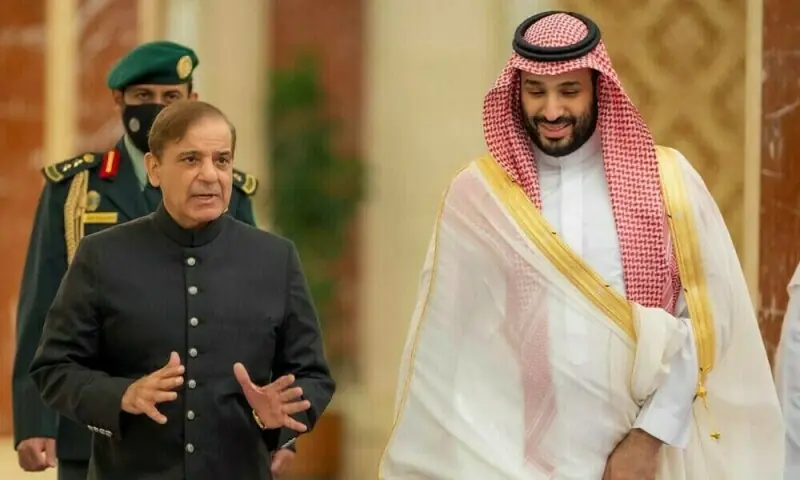By Gohar Ali Khan
Copyright brecorder

KARACHI: The signing of the Strategic Mutual Defense Agreement (SMDA) between Saudi Arabia and Pakistan has opened a new chapter in bilateral relations on various fronts, experts say.
There is much potential to boost investment and explore joint ventures, foreign direct investment, oil & gas energy cooperation and IT exports, according to economic nationalists and strategists.
Talking to Business Recorder, they said it is expected that Pakistan’s textile, pharmaceutical, rice, sea food, meat, edible fruits and vegetable, dairy products, leather goods and information technology all have the potential to be exported to Saudi Arabia, which can be further developed after this defense pact.
Pakistan-KSA defence agreement termed ‘historic milestone’
They stressed that there is an urgent need to further deepen compliance of standards, and deal with a lack of information and lack of commercial activities between the countries.
Moreover, there is a need to negotiate trade impediments related to compliance, standardization, sanitary and phytosanitary standards (SPS), technical requirements, conformity assessment and rules of certificates of origins for enhancement of Pakistan’s exports to Saudi Arabia.
Saudi policy makers should also chalk out a comprehensive strategy for mutual recognition of standards for exports of surgical instruments, food items and pharmaceutical goods as there is a huge demand for these products in Saudi Arabia, they said.
Pakistan’s macro-economy
Speaking about the defence pact, economic strategist and regional expert Dr Mehmoodul Hassan Khan said: “Hopefully, the enhanced defence ties between the two countries will have positive implications for Pakistan’s macro-economy.“
“Additionally, extension of loans, provision of oil against deferred payments, buying of JF-17 Thunder, greater inflows of foreign direct investments and deeper trade should be expected after this historic defense pact which has become a paradigm shift.”
Moreover, the triangular Pakistan-Saudi-China partnership could be a game changer for the further strategic expansion of the Belt and Road Initiative-China-Pakistan Economic Corridor (BRI-CPEC) supporting agriculture, industrial, energy and space & sciences cooperation in the days to come.”
Opinion: Defence deal with KSA: symbolism, stakes, and reality
He also explained that chances of offering fertile land to potential Saudis investors, export of skilled labour and potential food security links, plus worker remittances would give Pakistan a chance to stabilize its economy through jobs, capital, and technology.
The immediate surge in Pakistan’s stock market after the pact reflecting investor confidence is likely to ease the country’s financial burden.
Dr Khan said it appears that the launch of the Saudi Oil Facility (SOF) will support Pakistan’s oil imports, helping to stabilize energy costs amid external financing challenges. This project will strengthen Pakistan’s economic resilience by securing a stable supply of petroleum products while reducing immediate fiscal burdens.
The facility is part of broader financial cooperation between Pakistan and Saudi Arabia, which has already placed $5 billion in deposits with the State Bank of Pakistan (SBP).
Moreover, the Saudi Fund for Development (SFD) has supported more than 40 projects and programmes valued at approximately $1.4 billion to finance energy, water, transportation and infrastructure projects in Pakistan.
Pakistanis constitute one of the largest migrant communities in Saudi Arabia with an estimated 2.64 million working there as of 2023. While 97 percent of them are blue-collar workers, there is a growing demand for skilled labor in the Kingdom as it seeks to modernize its economy under the Vision 2030 scheme.
Innovative financial payments systems, use of fintech and panda bonds may also be considered to take leverage of the SOF.
What’s more, Saudi Arabia is going to be a technology powerhouse in years to come, and economy analysts and strategists say this augurs well for Pakistan as it plans to expand its digital and economic collaboration with the Kingdom.
Excelling in IT exports
According to the SBP, IT exports rose to $691 million during the period of July to August as compared to $584 million reported in the same period of the last year, while showing a surge of $107 milion year-on-year.
To excel in this space, the government of Pakistan has already concluded an AI policy, national fiberization policy and semiconductor policy contributing their mark Pakistan’s journey towards a tech-driven future.
Moreover, a key achievement is the passing of the Digital Nation Act 2025. Pakistan’s IT sector can earn foreign exchange from Saudi Arabia’s growing tech industry by offering skilled talent, cost-effective solutions, and specialized services through joint ventures and technology transfer agreements, and by participating in various IT expos and other bilateral forums to foster long-term business partnerships and investments.
Pakistan’s IT sector should explore opportunities in AI, fintech, cybersecurity, and cloud computing in Saudi’s market offering cutting-edge technology solutions, world-class digital services, and a highly skilled workforce seeking long-term partnerships for shared growth.



